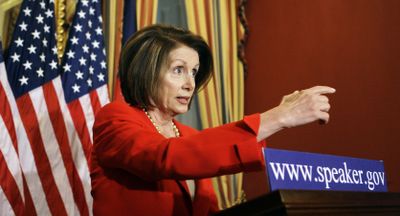Congress advances huge budget plan
Spending blueprint passes on party lines, but tough debate on details lies ahead

WASHINGTON – Congressional Democrats overwhelmingly embraced President Obama’s ambitious and expensive agenda for the nation Thursday, endorsing a $3.6 trillion spending plan that sets the stage for the president to pursue his most far-reaching priorities.
Voting along party lines, the House and Senate approved budget blueprints that would trim Obama’s spending proposals for the fiscal year that begins in October and curtail his plans to cut taxes. The blueprints, however, would permit work to begin on the central goals of Obama’s presidency: an expansion of health care coverage for the uninsured, more money for college loans and a cap-and-trade system to reduce gases that contribute to global warming.
The measures now move to a conference committee where negotiators must resolve differences between the two chambers, a prelude to the more difficult choices that will be required to implement Obama’s initiatives. While Democrats have sanctioned the president’s vision for transforming huge sectors of the economy, they remain fiercely divided over the details.
There is no agreement, for example, on how to pay for an overhaul of the health care system expected to add more than $1 trillion to the budget over the next decade, nor is there consensus on how to spend the hundreds of billions of dollars the government stands to collect by setting limits on greenhouse gas emissions and forcing industry to buy permits to pollute. Those issues will be decided in committees where lawmakers have already begun the torturous work of filling in the specifics of Obama’s broad plans.
“Democrats in the House and, I think, the Senate are shoulder to shoulder with the president in trying to make the big decisions we need to make in this country,” said Rep. Chris Van Hollen, D-Md. But, he said, “Hammering out the details will require everyone to roll up their sleeves.”
Republicans blasted the Democratic budget as a reckless manifesto that would greatly expand the size of government and double the national debt within five years. Senate Minority Leader Mitch McConnell, R-Ky., said he feared the consequences of a budget that “calls for a dramatic and potentially irreversible shift of our nation to the left in the areas of health care, education and private enterprise.”
Democrats rallied behind the president, however, arguing that their budget would rebuild an economy ruined by eight years of Republican leadership. In the House, fiscal conservatives generally fell in line behind the plan, even though it would generate a deficit of more than $1.2 trillion next year and produce large annual deficits well into the future. The progressive caucus offered an alternative budget plan primarily to voice opposition to the war in Iraq, though many of its members also voted for the revised Obama budget plan.
“It’s nice to support a president who’s got a brain and a heart – and uses them both,” said Rep. Lynn Woolsey, D-Calif., co-chair of the progressive caucus.
The House voted 233 to 196 to support the Democratic budget proposal, with just 20 Democrats voting with Republicans in opposition. The Senate approved its blueprint 55 to 43, with all but two Democrats voting yes.
The biggest dispute between the two chambers is whether to use a powerful procedural shortcut that could allow Obama’s health, education and energy initiatives to pass the often balky Senate with 51 votes rather than the usual 60, eliminating the need to win over any Republicans.
Encouraged by the administration, the House on Thursday voted to include the procedure, known as reconciliation, in its budget plan to speed health care and education legislation. But Senate Republicans – and some Senate Democrats – argue that the maneuver would make bipartisan cooperation all but impossible on some of the most significant measures to come before the Senate in years.
The Senate, meanwhile, has roundly rejected reconciliation for Obama’s cap-and-trade proposal, adopting an amendment to ban the maneuver by a vote of 67 to 31. The House budget does not include cap-and-trade in its reconciliation provisions. But neither fact has deterred cap-and-trade advocates, and administration officials support leaving the door open in the budget blueprint when it emerges from conference committee for a final vote later this month.
Other differences between the two chambers are comparatively minor. Both the House and Senate budget plans would authorize about $3.6 trillion in spending next year, about $100 billion less than Obama had requested.